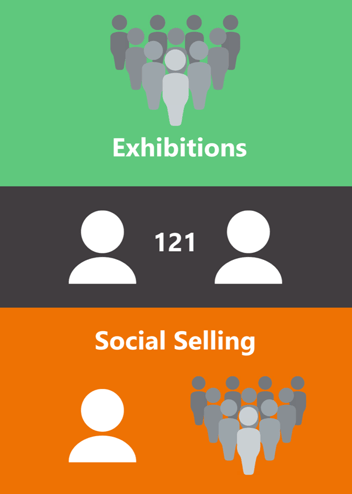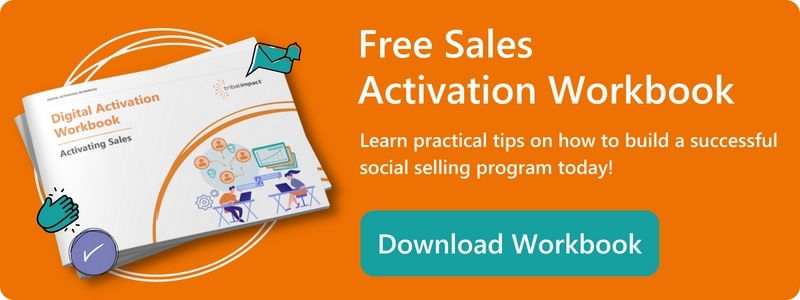
Exhibitions have long been used by manufacturers to reach the masses at scale, but this approach fails to personalise interactions with prospects like 121s, and the problem with 121s is that it isn’t scalable. But the pandemic has forced manufacturers to turn to social selling and they’ve discovered that it is like combining the best of exhibitions and 121s, which is the be personal with your prospects at scale.
We’ve predicted for a while now that manufacturers would have to play catch up with other industries and adopt social selling - especially as it’s a perfect-fit industry for it to be successful.
And while events and face-to-face meetings may now be possible once again, that doesn’t mean manufacturers will now be returning to the days of calendars jam-packed with exhibitions and face-to-face meetings.
Certainly not if our recent conversations with client manufacturing marketing managers are anything to go by, Instead, they’re relishing the scalable solution to deliver personalised interactions with prospects that social selling brings.
So why did the pandemic result in such a positive about-turn for many manufacturers?
Buyers Were Going Increasingly Digital Long Before COVID Hit
Customer’s greater use of digital channels was cited as the most likely to impact manufacturing businesses over the next 6 months and 1-2 years. (At 52% compared with the second most impactful, omni-channel, at 39%).
Greater use of digital channels PWC’s Manufacturing COO Pulse Survey 2021
B2B buyers are increasingly wanting a sales-free experience as much as possible. Gartner recently found that 33% of B2B buyers want a sales-free experience and this jumps to 44% for millennials. They therefore predict that by 2025 80% of interactions between sellers and buyers will be digital.
As much as seeing how a product works is critical for manufacturing buyers, they are prime candidates for the move towards online self-serving of information. In fact, more so than in other industries.
As we’ve explained in a previous blog, B2B manufacturing buyers are typically analytical in nature, meaning that they relish the opportunity to thoroughly research and compare their options in their own time - something the traditional sales model is at odds with but social selling caters to.
Personalisation Has Become Crucial
Nowadays, B2B buyers have come to expect the kind of personalised interactions that they experience in their personal lives as consumers.
Demand Gen’s 2019 B2B Buyers Survey Report found that:
- 70% of B2B buyers ranked “relevant content that speaks directly to our company” as “very important”.
- 96% of B2B professionals considered messaging that “spoke directly to our industry needs” to be important.
While exhibitions deliver a message to the masses and an opportunity to see product demos, it’s difficult to create personalised experiences for customers and prospects who visit stands.
Meanwhile, 121 meetings can provide that much-needed personalised experience but they’re not scalable due to travel constraints. (And it’s also an expensive way of providing it!) They’re also limited to further down the funnel, whereas social selling can provide personalised interactions from the very outset.
Social selling - wide reach, scalable and personalised
121s - limited reach, personalised, not scalable
Exhibitions - middle reach non-scalable, non-personalised

The Buying Cycle Is Getting Larger And More Complex
Each year, the B2B circle of decision makers and influencers is getting larger (now standing at between 6 to 10 people) and the decision-making process more complex.
The manufacturing sector is no exception. In fact, it’s quite the opposite, with the web of channel and distributor relationships that need to be considered and the generally larger-than-average B2B deal size.
All of which means that the chances of identifying and influencing all the decision makers via exhibitions or 121 meetings is very unlikely. However, with social selling, it’s easier to identify and influence all the decision makers early on.
How Social Selling Helps Manufacturers Scale Selling & Get More Personal
Social selling is about much more than using social channels to scale your brand message. Instead, it focuses on highly personalised content that’s relevant to what your buyers need right now (which often changes quite rapidly) -leading to relevant and timely conversations specific to their needs.
Here’s how it does so:
- It meets buyers on their terms, where they are actively searching for information. 75% of B2B buyers now use social media to help them make purchasing decisions
- Social listening tools give deeper, no-holds-barred insights into what your buyers care about when selecting products.
- It’s much easier to identify perfect-fit customers. When you combine LInkedIn sales Navigator with intent tools such as Bombara, you can quickly identify who is in the buying circle, those who influence it and exactly how much intent they have to buy based on their internet search history.
The top primary benefits of using social selling tools cited by B2B professionals was reducing the amount of time spent researching accounts and contacts (39%).
Survey by CSO Insights and Seism
- Your sales team becomes pro at content creation and identifying content gaps. Instead of waiting on marketing to create “perfect-fit” content, social selling encourages a constant dialogue between marketing and sales as to what content is needed and why. Not only that, social selling training focuses on enabling sellers with the right tools to create personalised content themselves - meaning less chance of missing an opportunity.
As you can see, social selling is like having 121 but at scale, because you reach people when they’re ready to engage and on the terms they choose. Everyone may be fed up with the term “the new normal” but in the case of manufacturing, social selling is set to become the new way of doing business for sales.
If you’re ready to embrace it, why not download our eBook: How to Kickstart Your Social Selling Program?
It’s full of practical tips on how to set up your program for success, the common mistakes to avoid, the importance of training and the tools available to help. And much more.
